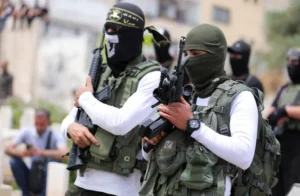“PIJ is an absolute proxy of Iran,” former deputy commander of the IDF’s Gaza Division Brig. Gen. (res.) Amir Avivi said.

The current escalation between Israel and the Palestinian Islamic Jihad (PIJ) in Gaza is the result of Iranian orders, Israeli Brig. Gen. (res.) Amir Avivi tells The Media Line.
“The military operation in Gaza began with an interception of a terror squad on its way to carry out an attack on Israel. This sort of attack, challenging the highest levels [of decision makers] in Israel, wouldn’t just require approval from Tehran, but is most likely an Iranian initiative,” Avivi says.
“As we speak, the PIJ leader, [the Syria-based] Ziyad al-Nakhalah, is in Tehran, meeting the Iranian president and the IRGC commander. PIJ is an absolute proxy of Iran. Tehran funds it and runs it,” he adds.
Palestinian Islamic Jihad is an Iranian-backed militia force in the Gaza Strip, and estimations are that Tehran is funding the organization to the tune of between $30 million and $40 million a year.
Avivi, who served as the deputy commander of Israel’s Gaza Division, is well-acquainted with the heated Gaza front.
Terror infrastructure
“Most of the budget from Iran is being used to build tunnels. Some defensive tunnels, and others that enable surprise attacks on Israeli forces.”
Brig. Gen. (res.) Amir Avivi
“Most of the budget from Iran is being used to build tunnels. Some defensive tunnels, and others that enable surprise attacks on Israeli forces,” he explains.
The Israeli military announced on Sunday morning it had destroyed an attack tunnel, as part of the campaign against PIJ infrastructure.
“It was an operational tunnel that got quite close to the border and could have been used to carry out an attack on Israeli troops,” an official military party told The Media Line.
“I can carefully estimate there are dozens of more tunnels, built for that purpose by PIJ,” Avivi says.
Avivi is the founder of the Israel Defense and Security Forum, in Hebrew “Habithonistim” (“The security-minded ones”), an organization comprising former military and police officers that supports annexation of the West Bank and a proactive Israeli military agenda.
“What we’re seeing right now is a decision made by Iran and PIJ to escalate the situation. I’m not involved in the details, but I can assume it has to do with Iran wanting to take revenge on Israel for many hostile actions attributed to it, like bombing nuclear facilities and assassinating Iranian officers and scientists,” he says.
“I estimate this round will end in two or three days, but the question is, what is the [Israel’s] long-run strategy? Will it be waiting for another blow or taking the initiative and crafting the security reality? I don’t have a complete answer [to the Gaza problem], but being active is definitively a better option,” Avivi says.
Brig. Gen. (res.) Hasson Hasson, another member of the Israel Defense and Security Forum, spoke to The Media Line about the behind-the-scenes efforts to reach a cease-fire.
“The Egyptian mediation is done by the Egyptian Mukhabarat [General Intelligence Service − A.K]. They have very good communication with both sides and have been doing a great job for years,” he says.
Hasson served as military secretary to the Israeli president for almost a decade and was present at very sensitive moments, including during past escalations with the Gaza Strip.
“Hamas can be helpful with the negotiations for a cease-fire. It proved to be useful in the past, as it is the dominant party on the ground. They can provide information about PIJ and help pressure them. Even if it’s not military intelligence, this information can be very helpful in a negotiation,” he says, when asked about the dynamics between Israel and Hamas.
As to why Hamas, a radical Sunni Muslim militia that is dedicated to the destruction of Israel, would assist the Jewish state, Hasson says it has its reasons.
“Hamas has a lot to gain from Israel attacking only PIJ. These two organizations have a rivalry, and eventually Hamas benefits from PIJ losing military infrastructure, if the rest of the Gaza Strip isn’t under acute danger,” he explains.
This is one of the reasons Israeli attacks in the Gaza Strip this weekend were directed at PIJ-related targets only and not Hamas. “We want to keep Hamas uninvolved because we are aware of the political efforts to prevent a further escalation,” an official military party told The Media Line.
While a cease-fire is now scheduled to take effect Sunday at 11:30 pm local time, both Israel and PIJ are aware that agreements might break down and the fight could go on for another few days.
“We are preparing for a week of fighting, with reserve forces and dozens of PIJ targets we can destroy. But we are hoping it’ll end sooner,” the military official told The Media Line.
